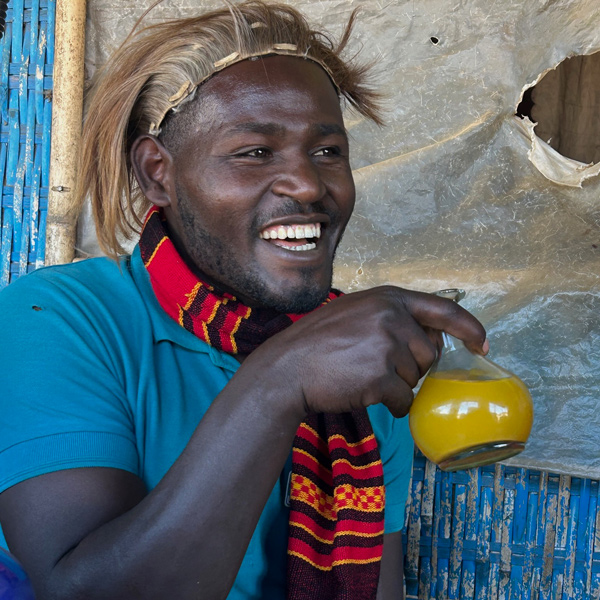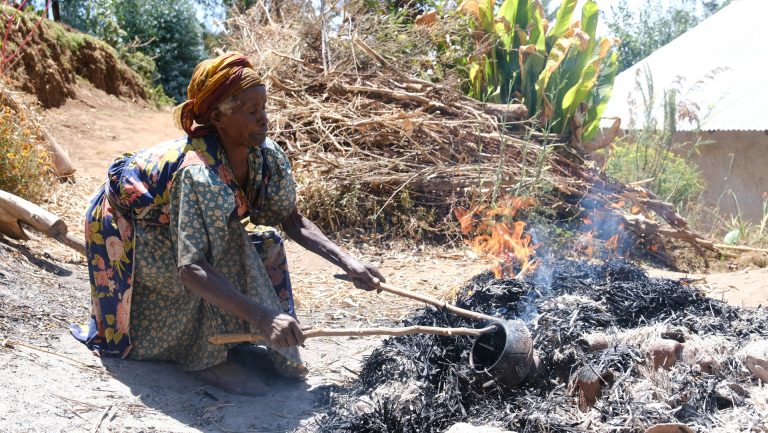The first sip wasn’t coffee..
I We thought we knew...
Three hours of ceremony in Bonga. Every detail held us spellbound — except the one that mattered most.
I lifted the jebena from Almaz’s shelf without thinking, mid-conversation. Then I stopped.
“This feels nothing like the ones we bought in Addis,” I said to Nick. The difference was immediate — weight, texture, an irregularity that wasn’t flaw but intention.
We’d sat through a three-hour ceremony in Bonga just days earlier. Beans roasted, ground, poured in rhythms choreographed over centuries. We left convinced we’d finally grasped Ethiopian coffee culture. We even bought jebenas from the market, imagining we could carry the magic back to London.
But the pot in my hands refused that fantasy.
Almaz said quietly:
“My grandmother shaped this. Her hands, her clay, her fire. Tourist jebenas hold coffee. Grandmother jebena holds coffee spirit.”
The words landed heavier than the vessel itself.
Nick broke the silence. “Then how do we learn to make the real thing?”
Almaz’s smile was measured, almost warning.
“First, you survive Asck’s test. She protects the clay spirits. Many try. Most fail.”
We’d come chasing coffee stories. Instead, we’d been handed an initiation.
“Tourist jebenas hold coffee. Grandmother jebena holds coffee spirit.”
— Almaz, Cultural Connector
II Into the Clay
Sacred earth gathered by blessed hands. Not a craft, but an initiation into mysteries buried in the soil.
The path to Asck’s hut wound through highland fields that felt more like passage than walk. When she appeared, her hands told the story first — darkened, permanent, shaped by decades of clay.
She looked at us hard, then spoke a rush of Amharic that made Kia hesitate before translating.
“She says foreigners want quick lessons. They make one jebena, take photos, claim they understand. This wounds clay spirits. Dishonours ancestors who protected this through terrible times.”
The air thickened. We weren’t students. We were intruders.
Asck pointed to a blackened pot simmering by the fire. She poured golden liquid into two cups and set them down with ceremonial weight.
“Drink,” Kia said softly. “It’s her test.”
We lifted the cups of tej. Honey wine that demanded patience. The first sip thick, almost too sweet. The second, unfolding into something endless. We found ourselves slowing, breath catching its rhythm.
And then it struck: our first sacred sip in Ethiopia wasn’t coffee at all. It was this honey wine — a test that reset everything we thought we knew.
Asck watched without expression. Only when we’d drained the last drop did she speak again.
“Clay teaches patience. Rush it, and spirits abandon the vessel.”
She pressed a handful of earth into our palms. “This clay comes from deposits near Debre Libanos monastery. We collect only when spirits permit — dry season, blessed hands, proper prayers. Metal tools wound clay. Machine gathering kills spirit.”
The words carried weight heavier than the soil itself.
The test wasn’t about honey. It was about time. And whether we could surrender to it.
“Metal tools wound clay. Machine gathering kills spirit.”
— Ask, Master Potter

Become a Cultural Passport holder
We thought we were learning to drink coffee. Instead, we discovered a world hidden in plain sight — and we don’t want to walk it alone. Becoming a Cultural Passport holder is how you step into the story with us. Every month brings you closer to the hands, histories, and hidden knowledge behind your cup — while directly supporting the producers who keep it alive.
Step into the Story20% of every subscription directly funds community projects with our producer partners.
III Hands, Fire, Silence
Seven days of shaping, firing, waiting. A pot is made — or perhaps something else is being born.
On the seventh day, elders gathered to bless the finished vessels. Sacred water, ancestral invocations, gestures older than memory.
Asck placed her jebenas before them with the same reverence she’d shown in shaping clay and tending fire. The blessing transformed them — not objects, but instruments charged with meaning.
And in that moment, history pressed close. Monasteries once commissioned jebenas as spiritual instruments, not household tools — the vessel was the prayer. Watching the elders now, it was clear: the tradition wasn’t nostalgia. It was continuity.
Our practice pieces sat mute in the dust. Hers seemed to breathe.
We hadn’t learned to make pottery. We’d glimpsed a technology of spirit that had never stopped flowing through Ethiopian hands.
“Monasteries once commissioned jebenas as spiritual instruments, not household tools - the vessel was the prayer"
IV Like Duh!
Watching the blessing, Bonga floods back. We weren’t watching coffee ceremony — we were watching sacred technology activate.
An elder lifted Asck’s finished jebena and spoke prayers over it, words sinking into clay like rain. Something invisible sealed inside the vessel.
And then it struck.
Bonga crashed back — the ceremony we thought we’d understood. The careful way the jebena was handled. The reverence that surrounded not just the coffee but its container.
Like duh!
We hadn’t been watching coffee ceremony at all. We’d been watching activation. Every detail we’d missed — the balance, the positioning, the handling — was about this. The vessel wasn’t a prop. It was the ceremony’s engine.
Our tourist market pots sagged in our bags — smooth, glossy, lifeless. We’d bought them with pride, convinced they’d carry the ceremony home to London.
Now, standing in front of Asck’s fire, we saw the truth before ever pouring a cup: they weren’t vessels of spirit, only souvenirs.
Nick exhaled sharply. “If we missed this… what else have we been blind to?”
I didn’t answer. Because I was asking the same.
V The Questions That Remain
If sacred vessels hide in plain sight, what other invisible knowledge walks past us daily?
That night I turned my crooked practice vessel in clay-stained hands. It mocked me gently, a reminder of everything I didn’t know.
If jebenas demand sacred clay, ancestral fire, elder blessing — what of the roasting pan? The cups? The incense burner? Are they technologies too?
We couldn’t unlearn this. Couldn’t go back to fast coffee and spiritless equipment.
And I kept thinking of that first sip — the one that wasn’t coffee. Honey wine had slowed us, rewired us, demanded patience before we could even touch clay. Looking back now, it feels obvious. But in the moment, it was the doorway.
Tomorrow we’d seek the menkeshkesh — the traditional roasting pan. Another doorway. Another hidden system waiting to be revealed.
The clay had pulled us in. And now curiosity had us by the throat.
The adventure deepens.

